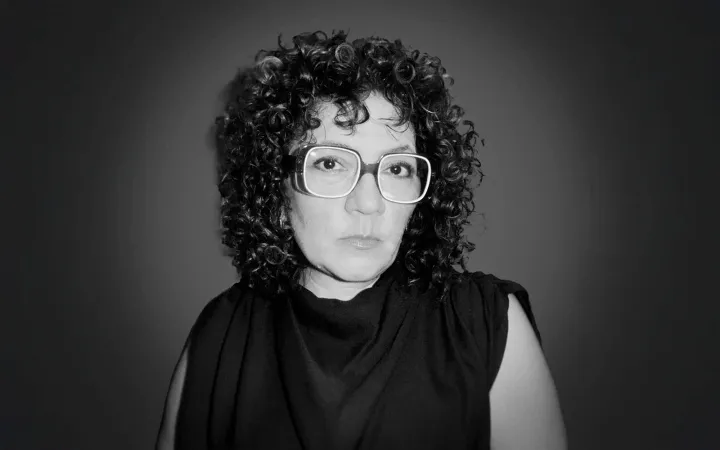Por Ana Sofia Pablo López

El 27 de marzo se estrenó el cortometraje ¿Puedo hablar con mi mamá? del director Flavio Florencio. En él, tres niños narran un día en ausencia de su madre, quien es trabajadora del hogar que cuida de otras familias mientras deja a la suya al otro lado de la ciudad. No quiero contarte mis impresiones del cortometraje —quiero que lo veas— pero sí compartir lo que su título significó para mí la primera vez que lo escuché. Tal vez te ayude a mirar desde otra perspectiva.
Soy Sofía Pablo, ex trabajadora del hogar y socióloga titulada. He sido protagonista de un comercial sobre seguridad social para trabajadoras del hogar y llevo diez años de experiencia en sociedad civil luchando sobre este tema. Pero ¿cómo llegué aquí?
La infancia en ausencia
Desde pequeña supe lo que era la ausencia. Mi padre, aunque conocía su nombre, nunca estuvo presente en mi vida. Mi madre, María Luisa, sí estaba, pero su labor como trabajadora del hogar la alejaba de nosotras, mis hermanos y yo. Cuando tenía un año de edad nos mudamos a Ixtapaluca, Estado de México. Con mucho esfuerzo, mi mamá compró un terreno, pensando en el futuro, aunque eso significara vivir lejos de todo. No había servicios públicos ni escuelas cercanas, así que cada mañana tenía que encontrar la forma de llegar a su empleo en Cuajimalpa, Ciudad de México, y otras alcaldías. En aquel entonces, el tráfico no era tan caótico como hoy, pero aun así pasaba muchas horas en el trayecto.
Me contó que salía de casa con lágrimas en los ojos, rogando a Dios que sus hijas e hijo estuvieran bien hasta su regreso. Solo éramos dos niñas y un niño y, como no había nadie más para cuidarnos, mi hermano, un poco mayor que nosotras, asumió esa responsabilidad.
Con los años, y mientras yo asistía a la escuela, mi mamá casi nunca asistía a las juntas escolares, ni en los festivales del Día de las Madres. No podíamos enfermarnos, salir a excursiones o esperar que tuviera vacaciones como nosotras. Con el tiempo entendí que no era porque no nos quisiera, sino porque día que no trabajaba, día que no se pagaba. Además, ¿quién dijo que las “muchachas”, como aún les llaman, tienen derechos?
Invisibilización y riesgo
Crecí viendo cómo el trabajo de mi madre era invisible, incluso para quienes la empleaban. Recuerdo dos momentos que marcaron esta realidad:
- La llamada de mi hermana: Un día, mi hermana decidió llamar al trabajo de mi mamá. “¡Bueno! Habla la hija de la Sra. María Luisa, ¿me pasa a mi mamá?”, preguntó. Del otro lado de la línea le respondieron: “Aquí no conocemos a esa persona”. Solo era nombrada y conocida por un apodo. Ni siquiera su nombre era reconocido en la casa donde trabajaba.
- El sismo del 2017: Cuando ocurrió el terremoto del 19 de septiembre de 2017, muchas trabajadoras del hogar perdieron la vida. No existía un registro de las personas que trabajaban en los edificios, sus empleadores no conocían su nombre completo ni tenían información de contacto de sus familias. Eran mujeres que pasaban años al servicio de un hogar, pero cuyas vidas quedaban invisibles en una emergencia.
La deuda pendiente
Cuando llegó el momento de elegir una carrera, dudé entre Veterinaria y Sociología. Me decidí por Sociología, influenciada por una maestra cuya forma de enseñar me inspiró profundamente. Al avanzar en mis estudios, tuve que elegir un tema para mis proyectos de seminario y tesis. No lo dudé: investigaría el trabajo del hogar, porque era la actividad que realizaba mi mamá y que yo misma había desempeñado.
Fue entonces cuando conocí a la empleadora de mi mamá, una mujer distinta a muchas otras. Ella sabía el nombre de mi madre, el mío, el de mi hermana y el de mi hermano. Recordaba fechas importantes y mantenía una comunicación abierta con mi mamá para conocerla y respetar su trabajo. Le decía a mi mamá: “si en su época hubieran existido las leyes que ahora existen, muchas trabajadoras del hogar no habrían sufrido abusos laborales y hoy estarían jubiladas”.
Esa empleadora, a diferencia de muchas, liquidó a mi mamá conforme a la ley y aún siguen en contacto. Un caso así no debería ser excepcional, debería ser lo normal.
Desde que inicié en el activismo y he conversado con mi mamá, he comprendido su historia y lo difícil que fue para ella. Sin embargo, esto puede cambiar si las personas empleadoras y las trabajadoras del hogar fortalecen su comunicación, no solo en lo laboral, sino también en el reconocimiento mutuo. Así, ningún niño o niña tendrá que preguntarse si puede hablar con su mamá, porque un empleo digno también significa tiempo para la familia.
Cada logro en mi vida se lo dedico a mi madre, María Luisa, una mujer indígena y migrante que luchó por darnos oportunidades que ella no tuvo cuando era niña: educación, alimento, un hogar, independencia económica.
Aunque el 30 de marzo, Día Internacional de las Personas Trabajadoras del Hogar, ya pasó, la reflexión sigue vigente. Su labor sostiene nuestras vidas, pero el reconocimiento no basta. Se necesitan derechos, condiciones dignas y seguridad social. Si en tu hogar hay una trabajadora del hogar, pregúntate: ¿estoy garantizando sus derechos? ¿Quién es la persona que trabaja y cuida de mi hogar?
#TrabajoDigno #DíaDeLasTrabajadorasDelHogar #DerechosLaborales
Las opiniones expresadas son responsabilidad de sus autoras y son absolutamente independientes a la postura y línea editorial de Opinión 51.






Comments ()